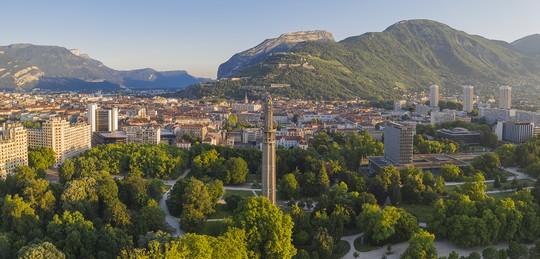Is Grenoble France’s Greenest City? – A Closer Look
Nestled at the foot of the French Alps, Grenoble has positioned itself as a beacon of sustainability in urban development. Renowned for its picturesque landscapes and rich cultural heritage, the city has taken ambitious strides towards becoming a model for environmental initiatives. From extensive cycling networks to renewable energy projects, Grenoble’s commitment to green living is drawing attention both nationally and internationally. But as cities across France embrace sustainability, the question arises: can Grenoble truly claim the title of France’s greenest city? This article delves into the initiatives, challenges, and comparisons that shape Grenoble’s green identity in the context of France’s evolving environmental landscape.
Assessing Grenoble’s Environmental Initiatives and Achievements
Grenoble has made significant strides in its quest to become an eco-friendly city, launching a variety of initiatives that focus on sustainability and reducing carbon emissions. The city’s public transport system is a prime example, boasting an extensive network of trams and buses powered by clean energy. Additionally, Grenoble has introduced bike-sharing schemes and pedestrian-friendly zones that encourage residents to opt for eco-conscious modes of transport. The results are evident, with a measurable decrease in urban air pollution levels reported over recent years.
Moreover, the local government has implemented rigorous policies aimed at enhancing green spaces and promoting biodiversity. Initiatives include urban gardens, reforested parks, and community clean-up days that engage citizens in preserving their environment. Notably, an ambitious waste reduction program has led to a significant increase in recycling rates across the city. Below is a table showcasing some of Grenoble’s recent achievements in environmental sustainability:
| Initiative | Description | Impact |
|---|---|---|
| Public Transport Upgrade | Transition to electric and hybrid vehicles | 30% reduction in emissions |
| Bike-Sharing Program | Offer over 1,000 bicycles | Increased cycling by 20% |
| Urban Gardens Project | Community involvement in gardening | Improved local biodiversity |
Innovative Transportation Solutions Paving the Way for Sustainability
In recent years, Grenoble has emerged as a pioneer in integrating innovative transportation solutions into its urban fabric, emphasizing a commitment to sustainability. The city’s extensive network of bike lanes has become a hallmark of its green infrastructure, encouraging residents to opt for cycling over driving. To complement this, Grenoble launched an ambitious public transport initiative that includes electric trams and buses, aiming for zero emissions by 2030. This multifaceted approach not only reduces carbon footprints but also enhances quality of life for its inhabitants.
Moreover, Grenoble’s collaboration with local startups has birthed a plethora of smart mobility technologies, making it easier for citizens to connect and navigate. This includes systems that provide real-time data for commuters, enabling them to choose the most efficient routes and modes of transport. Key features of this initiative include:
- Mobile applications for seamless journey planning
- On-demand shuttle services in under-served areas
- Car-sharing programs that significantly cut down vehicles on the road
As cities worldwide grapple with environmental challenges, Grenoble stands out as a model for sustainable urban transport, highlighting the importance of community engagement and technological integration in achieving eco-friendly goals.
Green Spaces and Biodiversity: Enhancing Urban Ecology
In recent years, Grenoble has made significant strides in showcasing how urban environments can harmonize with nature. The city has implemented an array of initiatives aimed at revitalizing green spaces, which not only support biodiversity but also improve the quality of life for its residents. Local authorities emphasize the inclusion of native plants, enabling various species of fauna—such as pollinators—to thrive. These efforts extend beyond simple parks, integrating green corridors and rooftop gardens that serve as vital habitats in the urban landscape.
A pivotal component of Grenoble’s urban ecology is the establishment of community gardens, where citizens actively participate in cultivating the land. This initiative fosters a sense of community while promoting sustainable practices. The city boasts a variety of green spaces, including:
- Parc Paul Mistral – A historic park offering biodiversity hotspots
- Jardin des Dauphins – A botanical garden focusing on conservation
- Rooftop Greenhouses – Innovative spaces for growing food and herbs
With these developments, the city not only enhances urban biodiversity but also educates its inhabitants about the importance of environmental stewardship, paving the way for a greener future.
| Green Space | Features | Benefits |
|---|---|---|
| Parc Paul Mistral | Walking paths, playgrounds | Encourages physical activity, connects nature |
| Jardin des Dauphins | Diverse flora, educational programs | Promotes biodiversity awareness, conservation efforts |
| Community Gardens | Urban agriculture, native species | Enhances food security, builds community |
Future Challenges and Recommendations for Sustainable Growth
As Grenoble strives to maintain its reputation as one of France’s greenest cities, several challenges loom on the horizon. Urbanization, while offering economic opportunities, continues to place strain on local ecosystems. The need for expanded housing and transportation options often conflicts with sustainability goals, leading to increased pollution and loss of green spaces. Climate change further complicates matters, with rising temperatures and unpredictable weather patterns impacting the effectiveness of existing ecological initiatives.
To ensure a sustainable future, key stakeholders must embrace a multi-faceted approach. Recommendations include:
- Enhanced Green Policies: Implement stricter regulations on building materials and urban planning to prioritize sustainability.
- Community Engagement: Foster active participation from residents in local sustainability projects to boost public commitment.
- Innovative Transportation Solutions: Promote electric public transport options and bike-sharing programs to reduce car dependency.
- Monitoring and Assessment: Regularly evaluate the effectiveness of green initiatives through comprehensive data analysis.
| Challenge | Recommendation |
|---|---|
| Urban Sprawl | Implement smart growth policies to manage land use effectively. |
| Air Pollution | Invest in green infrastructure, such as urban forests and gardens. |
| Resource Management | Adopt circular economy principles to minimize waste. |
Closing Remarks
In conclusion, Grenoble’s commitment to sustainability and green initiatives has positioned it as a leading contender for the title of France’s greenest city. Through innovative urban planning, robust public transportation options, and a dedication to preserving its natural landscapes, Grenoble not only enhances the quality of life for its residents but also sets a benchmark for other cities in the country. As it continues to evolve and adapt in response to environmental challenges, the city serves as a model for urban sustainability. The question remains: can Grenoble maintain its momentum and inspire a nation-wide shift towards greener practices? Only time will tell, but one thing is clear—Grenoble is firmly on the path to a more sustainable future.




